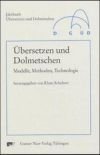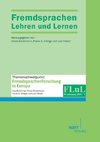
-
 Anglický jazyk
Anglický jazyk
Theories on the origin of the english progressive
Autor: Fritz Hubertus Vaziri
Seminar paper from the year 2007 in the subject English Language and Literature Studies - Linguistics, grade: 1,3, Free University of Berlin (Institut für Englische Philologie), course: History and Variation of English , 11 entries in the bibliography, language:... Viac o knihe
Na objednávku, dodanie 2-4 týždne
14.76 €
bežná cena: 16.40 €
O knihe
Seminar paper from the year 2007 in the subject English Language and Literature Studies - Linguistics, grade: 1,3, Free University of Berlin (Institut für Englische Philologie), course: History and Variation of English , 11 entries in the bibliography, language: English, abstract: The progressive form is a phenomenon frequently to be observed in Present Day English. But where does it actually come from? Has it always been part of English, or did it enter the language through another one? And if that is the case, which other language was involved?
Different theories offer different explanations on questions like the above. This paper attempts to give a brief illustration of the major ideas on the origin of the progressive as we know it today. A final conclusion will sum up central findings and try to articulate an opinion of its own based on the inspected data.
DENISON remarks that in Old English times constructions were used that consisted of two elements: a form of the verb beon/wesan and a present participle (V(i)ende). Such syntagms strongly resemble the progressive in its modern appearance.
There are several opinions circulating, as far as the question is concerned where the progressive comes from and how it turned out to be what it is now. Some scholars assume that the progressive developed as a result of a contact between English and the Celtic languages, others consider it more probable that an encounter with Latin was responsible, and finally, a third group believes no other language's influence played a role in the development of the progressive, but that it evolved instead within Old English independently. Relevant aspects of these positions will be shortly outlined hereafter. ISAAC points out "that there has been an undeniable contact between English and the Celtic languages" but remains sceptical with regard to the issue of this contact's significance for the development of linguistic features in English. MEID appears to be more confident in this matter, especially in connection with a possible Celtic influence on the English aspectual system.
And, indeed, several reasons suggest the possibility of a Celtic origin concerning the progressive form as it appears in Present Day English. The first is a very general one: Celtic has been among the languages that had some impact on the development of English at a certain point. Why shouldn't it be possible, therefore, that it was responsible for the progressive as well?
- Vydavateľstvo: GRIN Verlag
- Rok vydania: 2008
- Formát: Paperback
- Rozmer: 210 x 148 mm
- Jazyk: Anglický jazyk
- ISBN: 9783640138715




 Nemecký jazyk
Nemecký jazyk 

 Ruský jazyk
Ruský jazyk 



